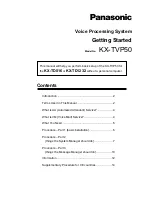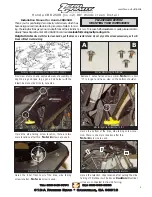
1 8
3.2 - I
NSTALLAZIONE
DELLE
F
ORCELLE
A
D
OPPIA
P
IASTRA
(F
IG
. C)
• In queste forcelle, con tubi portanti fissati a
vite sulla base di sterzo è necessario, prima del
montaggio sul telaio, controllate il serraggio
delle viti di fissaggio
(Rif. 1)
.
• La distanza
“D”
tra la base di sterzo e l’estre-
mità del pneumatico (gonfio) non deve essere
inferiore alla corsa totale
T+3 mm
.
A
TTENZIONE
:
Non posizionare la base di
sterzo al di sopra del gradino di lavorazio-
ne ricavato sui tubi portanti, al fine di evitare
l’eventuale rottura dei tubi stessi e procurare
gravi danni al ciclista.
A
TTENZIONE
:
un posizionamento diverso della
base rispetto ai tubi portanti può causare
il contatto tra pneumatico e base di sterzo e
procurare gravi danni al ciclista.
• Procedete al montaggio della forcella sul tela-
io, già provvisto di serie di sterzo.
• Installate la piastra superiore
(Rif. 2)
nei tubi
portanti e nel cannotto.
• L’estremità dei tubi portanti deve risultare a
filo o leggermente più bassa della piastra supe-
riore.
• In caso di eccessiva sporgenza degli steli,
spessorate, con distanziali
(Rif. 3)
, la piastra
in corrispondenza del cannotto di sterzo. Altri-
menti contattate il vostro centro di assistenza
tecnica per installare una piastra appropriata.
• Installate sopra alla piastra superiore il sup-
porto manubrio e il tappo
A-Head Set
, quindi
registrate lo sterzo.
• A questo punto bloccate definitivamente le viti
(Rif. 4)
sulla piastra superiore alla coppia
prescritta.
• Se per qualche motivo avete modificato la
posizione della base di sterzo rispetto ai tubi
portanti è necessario ristabilire la distanza
originale
(D)
• Serrate le viti
(Rif. 1)
di fissaggio dei tubi
portanti alla base di sterzo alla coppia pre-
scritta.
A
TTENZIONE
:
un serraggio eccessivo delle
viti
(1)
può deformare i tubi ed indebolire
la struttura.
3.2 - I
NSTALLING
A
D
UAL
C
ROWN
F
ORK
(F
IG
. C)
• Where the fork stanchions are bolted onto the
crown, check the tightening torque of the bolts
(ref. 1)
before installing the fork in the frame.
• Distance
“D”
between crown and tire edge
(when properly inflated) should not be lower
than total travel
T+3mm.
W
ARNING
:
Do not place the bottom yoke
above the machining boss on stanchions to
avoid any failures and prevent the rider from
being seriously injured.
W
ARNING
:
if the lower crown is improperly
positioned on the stanchions, then it may
contact the tire and cause severe injuries to the
rider.
• Assemble the fork to the frame complete with
the headset.
• Fit the upper crown
(ref. 2)
into the upper
stanchions and the steer tube.
• The stanchion edge must be aligned with or
slightly lower than the upper crown.
• If the fork stanchions protrude above the up-
per crown too much, then fit some spacers
(ref. 3)
under the upper crown on the steer
tube, or contact your dealer to get the appro-
priate upper crown.
• Fit the stem and the threadless
headset
cap
over the upper crown and then adjust the
headset.
• Now tighten the upper crown bolts
(ref. 4)
to
the specified torque.
• Check distance
(D)
if the lower crown has been
repositioned.
• Tighten the bolts
(ref. 1)
in the crown that
clamp the stanchions to the specified torque.
W
ARNING
:
do not overtighten the bolts
(1)
as this may distort the stanchion tubes and
weaken the structure.
Summary of Contents for Bomber 2002
Page 1: ......
Page 16: ...1 FIG ABB A H H FIG ABB B b1 b2 b2 i c a a l l l l l l b d f f g e d e h ...
Page 25: ...2 FIG ABB C FIG ABB E 2 3 1 4 Nm 11 Nm 9 D T 3 mm FIG ABB D 5 A Nm 10 Nm 9 7 9 7 8 6 6 8 ...
Page 36: ...3 2 3 3 2 4 8 Nm 20 7 9 9 LOCK LOCK 5 PL PRe PRi 1 1a 1 1 1 1 CR ECC AC 6 ...
Page 39: ...4 8 9 Nm 20 Nm 6 10 MONSTER 2002 7 Nm 20 5 6 Nm 6 SHIVER SC ...
















































